


























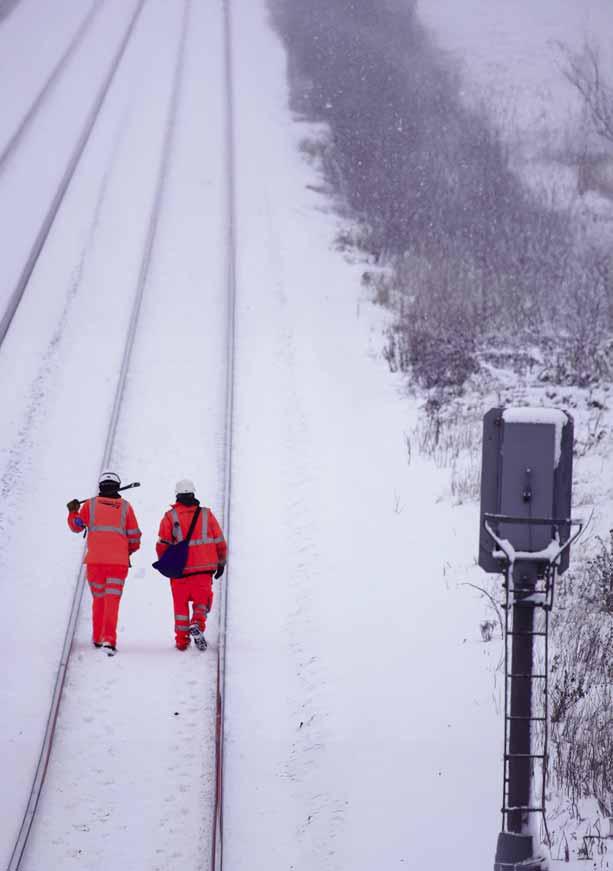
Use the QR code to join to get help at work and save money

RMT has developed a number of benefits to save members money. This includes negotiating access to savings and special offers from our approved partners.
The union has a dedicated team of elected officers and local reps to serve your interests negotiating with employers on issues from pay, hours of work, pensions and working conditions. They are supported by a team of researchers to formulate pay claims to obtain the best negotiated terms for you.
The union has a political fund to run campaigns and provide a political voice to benefit members’ interests in the workplace. RMT has a very active parliamentary group which raises issues of concern for members at Westminster, the Scottish Parliament and Welsh Assembly.
Personal injury claims cover if you suffer an accident in work or outside work. RMT underwrites settlements that would not be provided by no-win, no-fee companies. Call 08457 125 495.
Members who have suffered an industrial disease will receive free legal support to make a claim. Such claims are underwritten by the union and members will not have any deduction from their settlement unlike claims run by no-win, no-fee companies. Call 08457 125 495
Should a member find themselves unfairly
dismissed, discriminated against or have any claim which has reasonable prospects of success at an Employment Tribunal, RMT will provide legal representation and pay the fee. Even if the union is advised that the claim is unlikely to succeed, members who make a claim are eligible to receive free legal advice.
Payable if you have an accident at work or on the way to or from work. Accident benefit is only payable if you have been off for three days or more. Accident must be reported to branch secretary within 26 weeks in order to qualify for accident benefit.
Payable to any member who retires over the age of 60 or aged 55 if retired through redundancy or resettlement. Ill health retirement is also payable; proof of this must be sent with application for retirement benefit.
The union can provide a personal taxation service and will preparation service.
Payable to any member who is experiencing loss of wages through being permanently demoted or downgraded as a result of illness or injury.
Payment of £300 provided that member reports this to branch secretary within 12 weeks.
The beneficiaries of this fund would be any child of a member or spouse if the member dies in service or if a members’ spouse dies and the member has responsibility of the children. Benefit is paid while a child is in full-time education up until the age of 22. Payment is made quarterly and the rate is £12.00 per week for children up to the age of 16, then £12.75 per week from 16 to 22.
Accessible savings and affordable loans from RMT’s Credit union. www.rmt.org.uk/about/credit -union
Shop online with RMTrewards.com and earn cashback savings from hundreds of retailers, like B&Q, Argos and Tesco. It’s free to join, plus you’ll get a FREE £10 Welcome Bonus in your online account! (Terms and conditions apply) www.rmtrewards.com
if you drive a company vehicle as part of your job you can join the RMT fines pool for £7 per year. The Fines Pool will reimburse members for any speeding fines, related court costs and lost time to attend a court hearing. www.rmt.org.uk/memberbenefits/fines-pool
A Death Grant of £600 is payable to the nearest relative or legal representative if a member dies through any cause prior to retirement.
Fancy cashback on your everyday shopping? Use your RMT Prepaid Plus Cashback card at over 50 partner retailers, including Sainsbury’s, ASDA and Boots, and earn unlimited cashback! It’s different to a credit or debit card - you can only spend what you load so there’s less chance of getting carried away. www.rmtprepaid.com
As a benefit of your RMT membership you can register for £5,000 Free Accidental Death Cover. Cover is for UK residents aged 18-69.12 months free cover.
Annually renewable and always FREE. This policy is underwritten by Stonebridge International Insurance Ltd. www.rmtprotect.com
For a small monthly premium you can claim cash-back on dental, optical and therapy treatments. Visit www.bhsf.co.uk
Assistance for members with their potential employment tribunal claim offered through the RMT’s In-house Legal Department.

welcomes government moves to bring three more rail franchises back into public ownership this year marking the first step, under the new Passenger Railway Services (Public Ownership) Act, to establish Great British Railways.
After decades of wasteful privatisation, returning rail to public ownership is the first step towards building a reliable, affordable and integrated railway system.
Bringing infrastructure and passenger services back under one employer in public ownership, means proper investment in operations, harmonising conditions for staff and prioritising the needs of passengers.
However, the cost-cutting Modernising Maintenance programme imposed on Network Rail by the Tories over a year ago has been an unmitigated disaster.
A new RMT report, based on the testimonies of over 6,000 members, has exposed the fact that it has led to a 50 per cent cut in maintenance regimes, soaring safety risks, declining morale, staff shortages, more night work and growing competency gaps.
Urgent action is clearly required to address these issues to prevent a major safety incident and to restore workforce confidence.
An RMT survey of Elizabeth Line and London Overground staff also reveals overwhelming support for public ownership.
All these workers see first-hand how profit trumps safety, investment, and the quality of the service. Public ownership would ensure that every penny goes back into improving transport rather than enriching shareholder profits.
RMT and supporters also rallied
outside the Scottish parliament to protest plans by Scottish government owned rail operator ScotRail to reduce ticket office hours at 101 of its 143 staffed stations.
The ticket office is the only way for passengers to ensure they get the best value fare for their journey. Experienced and knowledgeable ticket office staff navigate the confusing and complex ticketing system to ensure passengers get the ticket they require.
As recent RMT research shows, passengers are being failed by the third-party online ticketing retailer Trainline with examples of passengers being mis-sold incorrect tickets, paying more and getting the wrong information.
On the maritime front, The union has received an improved offer for Royal Fleet Auxiliary members which includes improved pay, benefit protections and commitments to future improvements and member are being asked to vote to accept.
The RFA is the lifeline of UK naval operations worldwide including delivering humanitarian aid and this dedicated group of civilian mariners play a vital, often overlooked role.
Finally, I would like to extend our sincere and deepest condolences to the family and work colleagues of RMT member Jorge Ortega who lost his life while on duty at Ilford station on the Elizabeth Line. No transport worker should leave home for work and never return.

Mick Lynch

Members working for Caledonian MacBrayne have won an improved pay deal after rejecting an earlier inferior offer.
The union went into dispute with CalMac last year over two low pay offers which were overwhelmingly rejected by the workforce.
The deal includes a fully consolidated and pensionable four per cent salary uplift for all employees backdated from the end of September 2024.
There is also a £300 consolidated cash payment to shore based nightwatchmen, retail assistants and cleaners and an alignment of annual
Control Room grade members at MTR Elizabeth Line launched industrial action in December after rejecting the company’s latest pay offer.
Members are not working rest days or overtime in most of December and strike action was planned for New Year’s Eve as RMT News went to press.
The union has rejected the company's pay offer and is seeking improvements to holiday entitlement and a fair
reduction in working hours.
RMT general secretary Mick Lynch said that members play a vital role in running the Elizabeth Line and their demands for fair treatment on working hours and leave remain unmet.
"The current offer falls short, and our members are determined to secure a fair deal,” he said. The union has called for urgent talks with MTR Elizabeth Line to resolve the issue.
leave to 37 days for all shorebased staff.
RMT general secretary Mick Lynch congratulated the membership for standing firm for a better offer.
“These workers should be rightly recognised for the essential services they perform providing lifeline services to
island communities,” he said.
CalMac is the major operator of passenger and vehicle ferries to the west coast of Scotland, serving ports on the mainland and 22 of the major islands. It is a subsidiary of holding company David MacBrayne, which is owned by the Scottish government.

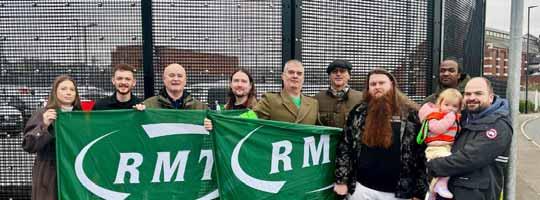

Strike action by RMT members working for Rail for London Infrastructure (RFLI) went ahead recently after the company failed to meet with the union to resolve a raft of serious issues.
The 24-hour walkout affected critical infrastructure repairs and maintenance across the network. RFLI is a Transport for London subsidiary that does infrastructure repairs and maintenance on the Crossrail Central Operating Section (CCOS). This makes up most of the route used by Elizabeth
line services that is not part of the Network rail network.
The dispute has come about due to RFLI’s refusal to address unsafe and exploitative working practices, including:
• Dangerous rostering practices that create instability and health and safety risks, including single rest days and shortnotice changes.
• Delays in skill-based pay progression, leaving members unfairly out of pocket despite developing their competencies.
• Deduction of paid meal breaks from annual leave entitlements, effectively cutting members’ leave.
• Promotion policies that favour external recruitment over the career progression of existing staff.
• Safety failings, with members raising concerns about inadequate planning and the compromising of safe systems of work.
RMT general secretary Mick Lynch said that members were taking action because the company had refused
to address legitimate concerns and had point blank refused to meet with the union.
“The company’s arrogance and disregard for its workers’ safety, pay progression, and working conditions is completely unacceptable.
“We remain ready to negotiate, but the ball is firmly in the employer’s court. Until they engage meaningfully with the union, our members will continue to fight for their rights and for a safe, fair workplace,” he said.
RMT has achieved a deal on London Underground after issuing strike dates and pursuing strong negotiations with tube management.
The union accepted London Underground’s latest pay offer, delivering notable improvements for members terms and conditions, including:
Pay increases: Lower-paid members will receive raises between 5 per cent and 6.6 per
cent, with an average increase of 4.6 per cent.
Protection of pay structures: Management’s attempts to freeze pay bands and introduce detrimental ‘job family’ structures have been scrapped.
Enhanced benefits: Improvements such as harmonised paternity leave extended to three weeks, three years’ protection of earnings
for medically displaced staff, and expanded eligibility for retired travel benefits have all been secured.
RMT general secretary Mick Lynch said that the agreement was a landmark victory for members and a vindication of RMT’s determination to fight for fair pay and conditions.
“By standing together and using the power of collective bargaining, we have not only secured a strong deal but also protected key safeguards that
underpin our members’ worklife balance and dignity in the workplace.
“This success highlights the importance of RMT’s resolute industrial approach, and we will continue to build on this momentum to deliver further improvements in 2025.
“The union remains committed to advocating for our members and defending their rights in the face of any challenges ahead,” he said.
Community campaigners in Padstow, Cornwall were celebrating recently after forcing the council to halt plans to close a bus terminus and remove a bus stop that would have forced passengers to walk up-hill to a new one.
The closure would have made bus transport less accessible for many users, particularly those with mobility issues.
RMT regional organiser Barry West organised a community campaign, including a petition of 1,250 signatures in seven days, against plans to remove the bus stop at a car park in Padstow and replace it with a new one about half-a-mile away.
Campaigners celebrated after a packed meeting of Padstow Town Council, which
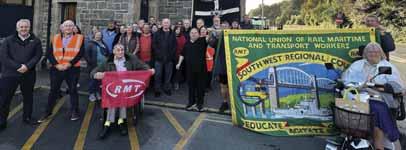
was addressed by members of the public, was forced to extend the deadline for a decision on the issue to April 5.
Barry said that there was overwhelming support for retaining the Bus terminus in Padstow and for improvements to be made.
“We should create a fully accessible inclusive transport hub fit for purpose that would

enable people of all abilities to use and benefit from.
“I believe there is room to accommodate all modes of transport at this important
location and for everyone to work safely and ensure that the future for this beautiful Harbourside town and the surrounding areas,” he said.

Unipart Rail Crewe workers took further strike action in response to the company’s derecognition of the union and its campaign of intimidation.
The action follows weeks of escalating hostility from Unipart Rail management, who have sought to undermine union representation through bullying and harassment.
Despite these tactics, workers remain united and determined to fight back.
Management’s actions to undermine lawful strike action include:
• Forcing workers to attend anti-strike briefings, where they were pressured to sign attendance sheets.
• Offering unpaid leave or college days to deter participation in industrial action.
• Issuing threats of disciplinary action and
monitoring picket lines for hours at a time.
RMT general secretary Mick Lynch said that Unipart Rail’s decision to de-recognise the RMT is an outrageous attack on workers’ rights and an attempt to silence their collective voice.
“This strike action demonstrates the strength and determination of our members to resist these attacks and
defend their rights in the workplace.
“Our action is lawful, and our members are fully entitled to take part. Unipart Rail has no legal basis to challenge us, so instead, they resort to harassment and intimidation —a strategy that will not succeed.
“RMT will continue to stand by our members and hold this anti-union employer to account,” he said.
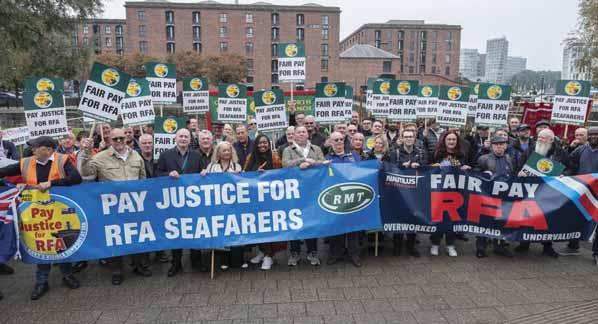
A new improved offer for Royal Fleet Auxiliary members which includes a substantial pay increase, key benefit protections and commitments to future improvements for seafarers has gone to referendum with a recommendation to accept.
The union is urging members to vote in favour to secure immediate backpay and the first two salary enhancements.
The new offer in their long-running dispute with the Ministry of Defence includes a three-stage salary uplift. This comprises a 6.5 per cent pay rise effective from July 2024, followed by two consolidated enhancements of £750 each, payable in November 2024 and February 2025.
Altogether, the deal provides RFA workers with a pay increase of 6.5 per cent
plus £1,500, significantly exceeding the current rate of inflation and representing a considerable improvement on previous offers.
On top of the salary increases, the agreement retains vital benefits, such as travel voucher concessions and the bonus scheme, which will remain in place until July 2025, when the next pay agreement is expected. The offer also introduces several additional measures to improve terms and conditions for RFA workers:
• A shorthand money allowance set at three per cent of basic pay.
• Reduced assignment lengths to support worklife balance.
• The option to cash in Earned Voyage Leave.
• A review of assignment lengths and Continuous
Pay arrangements.
• A commitment to ratify a new Collective Bargaining Agreement.
• Collaboration with the MoD to reset RFA pay, terms, and conditions comprehensively.
• Retention of the RMT RFA Convenor’s role.
RMT’s National Executive Committee (NEC) described the offer as the best achievable outcome through negotiations. The union stressed that the agreement positions members well for further discussions in 2025, where significant enhancements to pay and conditions will be pursued.
RMT general secretary Mick Lynch said that throughout the dispute, Royal Fleet Auxiliary members had shown remarkable commitment and solidarity.
“Their united and determined stance has demonstrated to the Ministry of Defence the strength of the RFA workforce and the union’s ability to stand firm on their behalf. I encourage every RFA member to take part in the referendum and have their say,” he said.
The RFA operates 13 ships staffed by UK merchant sailors, whose responsibilities are as varied as they are critical. From delivering fuel, supplies, and equipment to supporting humanitarian missions, RFA personnel ensure the Royal Navy can fulfil its responsibilities.
The union has insisted for many years that addressing the challenges faced by RFA personnel was the best way to honour their service and to ensure the continuity of their critical work.

RMT and supporters rallied outside the Scottish parliament in December to protest plans by Scottish government owned rail operator ScotRail to reduce ticket office hours at 101 of its 143 staffed stations.
These proposals would see the majority of ScotRail ticket offices closed for parts of the day they are currently open. The company has commenced a 12-week internal staff consultation on the proposals which ends in February.
Under these proposals, the overall weekly hours at the affected stations would reduce by a third. This means weekly ticket office hours across the ScotRail network would reduce by around 2800 hours a week.
RMT general secretary Mick Lynch said that ScotRail was trying to pull the wool over the public’s eyes by underplaying the extent of these cuts.
"Our analysis lays bare the real picture: over 100 stations stand to lose staffed hours,
putting passengers, staff, and service quality at risk.
"We are calling on the Scottish government to stop these plans before they do damage to Scotland’s rail service,” he said.
At some stations, reductions are so drastic they amount to closures in all but name.
For example:
• Dalmarnock faces a 90 per cent reduction, losing 96 hours weekly.
• Wemyss Bay would see a 61 per cent cut, reducing service by 70 hours per week.
• Ardrossan South Beach is set to lose 60 per cent of its hours, a cut of 69 hours each week.
In total, the cuts would reduce staffed hours by nearly 2,800 across the network every week, creating a sharp decline in available ticket office services.
ScotRail’s proposals include
minor increases in hours at 12 stations, largely by opening on Sundays, but RMT insists that any increase must not come at the cost of network-wide cuts, especially when nearly twothirds of ScotRail’s stations are already unstaffed.
Mr Lynch called on the Scottish government to intervene and abandon these reckless cuts.
“The government needs to ensure that ScotRail provides a safe, staffed, and accessible service that Scotland’s rail passengers and communities deserve," he said.
Richard Leonard, Labour MSP and long-time campaigner for railway workers, said that ScotRail’s plans to cut ticket office hours by a quarter across Scotland will not just deter people from using the railway, it will deny them access altogether.

proposals. This means that the Scottish government can also instruct ScotRail to scraps these plans at any time.
“This is a public service and ScotRail is in public ownership. The Scottish government still has the opportunity to put the public first and reverse these cuts,” he said.
The Cabinet Secretary Fiona Hyslop MSP confirmed that the Scottish government’s
RMT criticised ScotRail’s decision to hold the consultation in January 2022 when covid restrictions were still in place, and passenger demand was lower, and this was noted by Transport Focus in its response to the consultation: which stated “we are conscious the consultation
Crucially, since the public consultation was undertaken, the process via which Transport Focus must assess proposals has changed significantly. When assessing train company proposals to reduce or close ticket offices, it must now take into account a range of criteria including in relation to assistance services, product availability, safety and access to facilities. If ScotRail
was to hold a consultation now it would be under this new process. The fact that the company is relying on the outcome of a process which is now obsolete to progress these cuts means the whole procedure lacks any legitimacy and should be halted.
Since the public consultation, RMT and many MSPs have called on the Scottish government to listen to passengers and rule out any cuts to ScotRail ticket offices.
It is disappointing that the Scottish government has ignored these calls and has instead given ScotRail the green light.
Furthermore, it has not even required ScotRail to undertake a new public consultation via the current process.
This approach shows that both the Scottish government and ScotRail are completely out of touch with what passengers want. If they had listened to passengers who were unequivocal in their response to the 2022 consultation, they would have scrapped these plans a long time ago.






Show your support for the union.
Go to the RMT webshop on the RMT web site for more details.
Promote your branch, region and the union - call Pellacraft on 01623 636 602 if you have any queries.


South Western Railway, currently run by First Group and MTR, will be the first franchise to return to public ownership under the new Passenger Railway Services (Public Ownership) Act passed last November as part of the establishment of Great British Railways.
Rail services in Essex operating under the name of c2c, currently run by the Italian company Trenitalia, are also set to be brought into public ownership by July, with Greater Anglia services being taken in-house in the autumn.
RMT general secretary Mick Lynch said that it was a significant step forward for passengers, rail workers, and those who want to see an efficient rail system run for the public good, rather than private profit.
"After decades of wasteful privatisation, South Western
Railway, c2c and Greater Anglia returning to public ownership is the first step towards building a reliable, affordable, and integrated railway system.
“Bringing infrastructure and passenger services under one employer in public ownership, means proper investment in operations, harmonising conditions for staff, and prioritising the needs of passengers.
"RMT will support the roll out of Great British Railways and the tangible benefits a fully publicly owned rail system can bring,” he said.
The new law marks a fundamental break with the 31-year period of privatisation ushered in by the 1993 Railways Act, passed by John Major’s Tory government, which imposed a legal duty on the Secretary of State to deliver passenger rail services
through franchise agreements and a ban on any public sector operator running these franchises.
The Passenger Railway Services (Public Ownership) Bill was pushed through Parliament at speed to change that legal default and give the Secretary of State the power and the duty to appoint public sector operators as the default.
As such, it represents the first step in the process of reversing decades of fragmentation and private sector profiteering.
The government has pledged to bring forward a second and more major piece of legislation at some point before July which will show the government’s thinking about the likely shape of its publicly owned, nationally integrated railway – ‘Great British Railways’.
Ultimately, the passage into law of the Passenger Railway Services (Public Ownership) Bill effectively serves notice on private sector operators that as the full terms expire on contracts, they can expect to have notice served on them.
As this happens, the private operations will be absorbed, initially, into the Operator of Last Resort, which currently runs LNER, Northern, Southeastern and Transpennine Express.
Incoming Transport Secretary Heidi Alexander announced in the House of Commons that: “Following Greater Anglia, the programme will continue with the transfer of one operator’s services roughly every three months.
“We expect these to follow the order in which operators’ current contractual minimum terms expire unless
a TOC defaults on its contract to the extent that there is a contractual right to terminate or other extenuating circumstances arise,” she said in a statement.
The government has said that it expects the process of bringing franchises in house to be complete by October 2027.
As expected, the private sector has mounted resistance. Rail Partners, the industry’s lobbying group, condemned the Bill as “political” before disbanding. Meanwhile, operators are intensifying their exploitation of existing contracts, evidenced by soaring dividend payments (see table below).
In 2023, private operators distributed £165 million in dividends—double the previous year’s amount. Notable payouts include £44 million by First Group (SWR, GWR, and Avanti West Coast), and £30 million from East and West Midlands operations. Even Cross Country, under a remedial action plan with the Department for Transport, paid £7.3 million in2024. London concessions, such as the Elizabeth Line and London Overground, paid £17 million combined. While these services are not covered by the new legislation, RMT is campaigning to bring them,
alongside Merseyrail and the Docklands Light Railway, into public ownership.
Rolling stock companies (ROSCOs) remain another drain on public funds, extracting £331 million in dividends in 2023—far exceeding averages from the last seven years.
Privatisation was sold to voters as a way to foster competition, private investment and innovation. Yet, over three decades, these promises have proved false. Since 2006, only one per cent of rail investment has come from train operators, with 90 per cent funded by the government. Infrastructure costs, the most significant expense, have been borne entirely by the public.
Instead of competition, a handful of monopolies dominated, with franchises merely rotating among them. Fragmentation hindered progress on crucial projects like smart ticketing, as companies prioritised commercial interests over system-wide improvements.
Safety also suffered under privatisation. Railtrack’s profitdriven maintenance system resulted in a series of deadly accidents at Ladbroke Grove, Hatfield, and Potters Bar. Subcontracted maintenance crews, reduced staffing, and cost-cutting left infrastructure
in a dangerous state, forcing Labour to renationalise Railtrack in 2002 under the not-for-profit Network Rail.
Rail privatisation’s model insulated operators from infrastructure costs, allowing them to extract profits while leaving the public to pay for the expensive parts of the railway. This imbalance allowed operators to pocket £3.3 billion in dividends since 1996, while ROSCOs extracted £5.5 billion.
For passengers, the result has been rising fares—50 per cent above inflation—service fragmentation, and widespread dissatisfaction. The system’s lack of resilience became evident as franchises failed, and taxpayer bailouts became routine.
The Passenger Railway Services (Public Ownership) Bill was a monumental first step in restoring rail as a public service. While much work remains, RMT is committed to shaping the future of a publicly owned, nationally integrated railway that serves passengers and workers.
RMT will continue campaigning for the inclusion of all concessions and services into public ownership.
The end of privatisation is within reach and the vision of a railway system run for people, not profit can be achieved.
This is the start of a new chapter for Britain’s railways— and RMT will be there every step of the way.

RMT has welcomed Jersey’s decision to award the island’s key ferry service contract to DFDS which marks an important step forward in the fight to improve employment standards for seafarers.
DFDS recognises RMT on other routes and supports the adoption of a mandatory Seafarers’ Charter, a vital framework to ensure fair pay and decent opportunities for ratings and apprentices working in the short sea ferries sector.
The Seafarers Charter enshrines collectively bargained terms and conditions, along with key principles of direct employment, a safe roster pattern, ending voyage only contracts, setting pension and other social security rights above an international minimum, incentives for
training UK ratings and cadets and prohibiting deductions for accommodation costs.
For decades, incumbent operator Condor Ferries has exploited foreign seafarers on these socially and economically vital freight and passenger services between Portsmouth, Poole, and the Channel Islands.
Through its reliance on agency labour, Condor has driven down standards, paying workers appallingly low wages. In 2014, the union exposed that Ukrainian ratings were being paid just £2.35 per hour for three-month voyage-only contracts.
Condor’s entire fleet is registered under the Bahamas flag of convenience, a tactic used to avoid meeting UK employment standards and one that mirrors the practices of P&O Ferries. These
exploitative practices have suppressed local job creation and denied seafarers the decent wages and secure employment they deserve.
RMT calculates that over 200 ratings jobs could be created across the Condor fleet if employment was directly contracted and aligned with domestic standards. These jobs are critical for supporting the freight and passenger services that connect the Channel Islands to the UK, ensuring sustainable links for island communities.
£20 million in public funding has been committed to Portsmouth port, which hosts the freight route to Jersey, to decarbonise ferry services. This represents a significant opportunity to create more UK ratings jobs on greener and more
sustainable ferry operations. Investments in technologies such as shore-side power will pave the way for electric ferries, delivering environmental benefits while maintaining vital maritime links. RMT will continue to press for these developments to benefit both seafarers and the wider community.
The union has a long history of working with Crown Dependency governments to deliver fair and sustainable ferry services. Our recognition agreement with the Isle of Man Steam Packet Company, a publicly-owned service operated by the Manx Government, demonstrates the value of partnership in improving employment standards and service reliability.
RMT national secretary Darren Procter said that the
union was ready to work with Jersey to ensure that seafarers benefit from secure, fairly paid jobs and that ferry links meet the needs of passengers and freight users alike.
“While Condor, now majority-owned by Brittany Ferries, has been awarded the Guernsey ferry contract, the union continues its campaign to ensure employment standards improve across all Channel Islands routes.
“Decent pay, job security,
and opportunities for apprenticeships must be at the heart of all ferry operations,” he said.
RMT has also welcomed the Labour government’s commitment to introduce new laws in the Employment Rights Bill to stop another P&O Ferries scandal taking place and ensuring basic pay protections for seafarers.
RMT general secretary Mick
Lynch said that it was an important step in strengthening seafarers’ employment rights and conditions across the ferry sector and to extend collectively bargained terms and conditions for maritime workers.
“It was one of the most shameful episodes in UK industrial relations that P&O Ferries escaped prosecution for breaking employment law and replacing hundreds of
RMT seafarers with agency workers on sub minimum wage contracts bordering on modern slavery.
"Taking action to end fire and replacement and closing the scandalous loopholes that allow rogue employers like P&O Ferries and their wealthy owners in Dubai to act with impunity, is long overdue.
"It is shameful that the previous government refused to act in the interests of UK seafarers,” he said.

It’s been a busy year for RMT young members, and new year brings our annual conference, generously hosted by East Kent branch, which will be taking place at Canterbury Cathedral on Friday February 21 to Saturday February 22, 2025.
We have also seen further progress in our recruitment campaigns on health and safety reps and organising apprentices.
Through these campaigns the union has almost doubled the number of young health and safety reps and brought record numbers of apprentices into the union.
The committee has also run well attended education courses alongside the union's annual general meeting in Hull and at the Marx Memorial Library in London.
Each conference brings together educational sessions and speakers, business like motions and socials in the evenings. In past years, sessions have included training on organising your workplace, guests like Jeremy Corbyn and workshops on
how Great British Railways might work.
This year it’ll be more of the same with engaging speakers and organising workshops on winning at work and building effective communications strategies.
If you are aged 30 or under,
don’t miss out. Ask your branch or regional council to submit your application to the National Education Centre, Doncaster, or via email to m.cudjoe@rmt.org.uk by Monday February 10, 2025.

Cost-cutting programme creates low morale, growing safety risks, staff shortages and competency gaps



RMT’s hard-hitting report ‘Modernising Maintenance:12 months on’, based on the testimonies of over 6,000 members, has exposed the fact that the programme has led to a 50 per cent cut in maintenance regimes, elevated safety risks, declining morale, staff shortages and competency
In late 2023, Network Rail (NWR) implemented the ‘Modernising Maintenance’ (MM) initiative designed to slash costs which introduced significant changes to staffing structures, rostering systems, and operational practices without union agreement.
A year later, the union conducted a nationwide survey including maintenance and operations staff to evaluate the impact of MM. The findings paint a stark picture of a workforce struggling with the consequences of these so-called ‘reforms’.
One of the most striking outcomes of the initiative has been a shortage of skilled workers. Inadequate training programmes and limited opportunities for mentorship have placed additional burdens on experienced workers, who must take on more responsibilities, heightening the risk of burnout and reducing overall maintenance quality.
Safety concerns have also emerged as a critical issue. Workers reported practices that compromise safety, such as being assigned to oversee site safety in unfamiliar areas. Over half of respondents noted that fabricated fault numbers are being created to gain track access, circumventing proper protocols.
Meanwhile, delays in fault rectification have become commonplace, with many issues left unresolved for extended periods. Such practices jeopardise not only worker safety but also the safety of the public.
STAFF SHORTAGES AND COMPETENCY GAPS
MM introduced a voluntary severance (VS) scheme, which resulted in the departure of experienced workers. Recruitment has been slow, leaving significant competency gaps.
80 per cent of respondents identified staffing as a critical issue, with workloads rated at an average of 8 out of 10, signalling high stress levels. New recruits lack sufficient training, with 52 per cent highlighting inadequate support for skill development and 35 per cent citing poor mentorship.
Survey quotes: “Juggling with reduced staff numbers, an influx of new starters who have no useful competencies, and
the experienced staff leaving under the VS program has more than doubled the workload on supervisors and section managers.”
“Training is non-existent and of poor quality. We have lost too much experienced staff to lead those that remain.”
MM’s changes, including reduced team sizes and reliance on undertrained apprentices, have led to safety compromises. 24 per cent reported being assigned as Controllers of Site Safety (COSS) in unfamiliar areas, increasing risks due to a lack of site-specific knowledge. Fault management practices have worsened, with 56 per cent noting the use of fabricated fault numbers to access infrastructure.
Survey quote: “Apparently we are expected to COSS even if we don’t know the area. Despite the increased risk of errors when attending faults in an unknown area.”
Planning deficiencies are widespread, with 69 per cent of respondents reporting issues. Lack of collaboration and outdated planning documents exacerbate inefficiencies. A significant increase in degraded working practices and delays in fault rectifications was reported, with 85 per cent of operations staff observing more infrastructure faults.
Survey quote: “Faults are not getting completed in a timely manner, if at all. The list goes on and on.”
Apprentices are often overburdened and used to fill headcount gaps, limiting their ability to complete training assignments.
NWR’s increased reliance on contractors has undermined MM’s stated goal of reducing external labour. Concerns about the quality and experience of contractors are prevalent. Survey quotes: “Since MM, all apprentices are now considered team members, unlike before, and the opportunity to complete coursework is limited.”
“We are getting contractors sent to us; the majority of them have no idea about the job. This needs to improve.”
Over half of the workforce faces difficulties obtaining annual leave, with 31 per cent reporting significant challenges. The new rostering system is inequitable, causing disruptions to workers’ personal
lives and exacerbating stress. Frequent night shifts have worsened sleep patterns and overall health.
Survey quotes: “The fatigue index treats you like a machine. To satisfy the fatigue index, most overtime has to be preceded by a rest day, leading to terrible sleep patterns and poor work-life balance.”
“Nights have increased exponentially with little reasoning other than daytime line blocks being infeasible.”
Worker morale has plummeted, with an average score of 26.57 out of 100. Over 40 per cent of respondents are considering leaving Network Rail entirely. 63 per cent struggle to maintain a healthy work-life balance, and 58 per cent report high stress levels. These issues are compounded by presenteeism, as workers push through despite poor health.
Survey quote: “The whole situation has changed a job I loved and did well into one I dread every day.”
Operations staff overwhelmingly agree (96 per cent) that MM has not improved railway safety. Increased infrastructure faults and degraded working conditions are major concerns.
Fault rectification times have increased, with delays often resulting in normalized risky practices, such as allowing minor faults to persist until they become critical. Survey quote: “The response teams are constantly not manned as MM intended. P-way quite often have no cover and rely on other disciplines.”
Supervisors and section managers highlight that MM has led to unmanageable workloads, poor training, and insufficient resources. Managers often step into frontline roles to fill staffing gaps, further straining resources. Survey quotes: “Faults that used to be fixed within 1 to 2 hours can now take days.”
“It is just a matter of time until there is a serious incident on our network.”
The Modernising Maintenance programme, as evidenced by this survey, has led to widespread dissatisfaction, growing safety risks and plummeting morale. Staffing shortages, skills gaps and ineffective planning systems are central to these outcomes.
Urgent action is required to address these issues to prevent a potential major safety incident and to restore workforce confidence.

Night work is pushing rail workers towards dangerous health conditions and damaging their family lives, according to a new RMT report.
The union commissioned the research by Greenwich University after Network Rail (NWR) draw back from the findings of a report it commissioned from Nottingham University called ‘Rapid review of interventions to minimise the health impacts of night working’.
The union set out to obtain independent research on the impact on RMT members of night work on workers and their families given that some of the new NWR contracts require 39 weeks per year of night shifts and 39 weekends.
Based on interviews with rail staff from Network Rail, London Underground, and London Northeastern Railway, the study lays bare the severe impact of night shifts, highlighting widespread fatigue, long-term health problems, and intense pressure on family relationships.
The findings paint a bleak picture, linking night work to a range of physical and mental health risks, including cardiovascular disease, diabetes, and chronic sleep
disorders.
Fatigue from back-to-back night shifts leaves many workers unable to recover properly before their next shift, with this recovery time going unpaid and eating into personal time.
There are also growing concerns about worker safety, especially during long commutes home after a gruelling shift, with inadequate fatigue management making accidents more likely.
On the home front, night shifts are tearing families apart. Workers describe how working through the night cuts them off from their partners and children, leading to strained relationships and, in some cases, family breakdowns.
RMT general secretary Mick Lynch said that the report exposed the harsh truth about night work on transport workers.
“Our members are suffering serious health issues and struggling to maintain a worklife balance. Chronic fatigue is a reality for many, and the industry's failure to manage fatigue puts workers at risk.
“The rail sector in particular needs to step up and take immediate action to support night workers and protect their well-being,” he said.
The report also criticised management for failing to support night workers, with employees often left to deal with fatigue and health risks on their own. Many feel they cannot raise concerns about safety, while the physical demands of night-time maintenance work make conditions even tougher.
• Serious health risk: Night work is linked to higher rates of heart disease, diabetes, and severe sleep issues, compounded by chronic fatigue.
• Impact on families: Many night workers report feeling isolated from their families, leading to significant strain on personal relationships.
• Lack of managerial support: Workers feel let down by management, with minimal attention paid to their safety and well-being.
• Pressure to take overtime: Financial pressures and short staffing levels force workers into overtime despite health risks.
• Poor fatigue management: Inadequate systems leave workers vulnerable to accidents and further health problems.
Long runs of seven-night shifts are especially exhausting for workers and there needs to be consideration to reduce these to shorter blocks of night work and ensuring that the number of recovery days are sufficient to overcome sleep deprivation.
The Health and Safety Executive (2006) advises against slow rotations of seven nights, recommending instead fast rotations of a maximum of three nights in a row followed by at least two nights of sleep before a shift pattern change. These should be regarded as a minimum. The union needs to continue to negotiate rosters, with input from workers locally.
There needs to be greater levels of worker control over rosters and managerial support for roster changes and roster flexibility to reduce fatigue.
RMT is demanding that the industry overhaul night work policies, including offering more leave, compensating for recovery time, and implementing more flexible shift patterns to help workers manage their family commitments. Better fatigue management systems and stronger safety protections are also a priority.
Mr Lynch added: "We won't
sit back while our members’ health is jeopardised. The rail industry must act now to provide proper support and improve working conditions for night staff”.
JOHN, MAINTENANCE, NETWORK RAIL:
On management’s attitude towards safety:
"Nothing stops the job… you do what you're told, when and how you're told to do it… they don't want people to challenge [on safety issues]"
JACK, TRACK INSPECTIONS, NETWORK RAIL:
Critiquing managerial attitudes toward health and safety:
"Network Rail is not a family friendly company in the slightest. It likes to portray
itself as being that way, but it doesn’t care, and they don't care about safety. I mean, I've just told you a couple of horror stories there"
GRANT, SIGNALLING & TELECOMMUNICATIONS, NETWORK RAIL:
On overtime pressures affecting safety and wellbeing:
"If you don’t want it at all, they haven’t got any leverage. But if you’re someone who needs a bit of overtime from time to time, you’ll get pressured to do more, because they’ll take what overtime you’ve got"
PHILLIP, TEAM LEADER, SIGNALLING & TELECOMMUNICATIONS, NETWORK RAIL:
Describing increasing fatigue as a result of night work: "… when you get to 40 you
feel the effects of nights really hit you. I’d say I started feeling that maybe around 38ish, and I just pulled off and didn’t do as many extra shifts"
CHERYL, LONDON UNDERGROUND:
Describing increased workload and reduced staffing:
"My job is incredibly stressful with the workload, which is more than I can manage. So, there was a reformation of job roles in 2016 called ‘Fit for the Future’ on London Underground. I’m responsible for the management of staff and their performance and all of their issues at five stations... There should be 10 people that do my job to manage that workload. Currently, there’s six... Hence why we are under. Two people have been off long-term sick for over six
months with work-related stress as well as two vacancies"
JOAN, LONDON UNDERGROUND:
On increasing workload and monitoring:
"The work had changed to a call centre type environment with increased monitoring (including micro-management) by managers, the use of workflow KPIs, with less autonomy and more limited relationships with contractors and customers... the workload had increased due to more lines and stations to look after as well as new processes and systems with ‘teething problems,’ increasing the workload and time pressure"
*The full report Night work and its impact on workers and their families: The case of RMT workers is available on the RMT website.

Training workshops include violence at work, focus on the H&S six pack legislation, Musculoskeletal disorders, safety inspections, ORR inspectors/what to do when an inspector visits and night work and impact on fatigue.
Branches and regional councils nominate safety reps to attend conference. Completed nomination forms should be returned by email to the head office health and safety team on healthandsafety@rmt.org.uk by January 31, 2025.
Union finds that Trainline's ticketing system can lead to excessive pricing and confusing fare options
Trainline's destructive practice of ripping off passengers, misleading the general public, and undermining the integrity of the railways according to new RMT survey results.
The survey, which asked more than 2,600 rail workers about their experiences, uncovered a range of serious problems with Trainline's ticketing system — bogus tickets, excessive pricing, and confusing fare options.
The results show that Trainline does not deliver bestvalue fares and has put profits ahead of its commitment to deliver a public service.
Trainline has released its half-year results, following a September update revealing £2 billion in ticket sales and a 17 per cent revenue increase to £106 million in the first half of the year.
RMT general secretary Mick Lynch said that Trainline was clearly a profiteering machine that was ripping off passengers and unnecessarily costing taxpayers.
“Their model relies on hidden fees, deceptive ticket options, and overpriced fares – all designed to boost shareholder profits at the public’s expense,” he said.
Invalid Tickets and Extra Costs: Over 90 per cent of RMT members surveyed reported that Trainline sells tickets invalid for passengers’ journeys, forcing many to pay twice or risk penalties.

Nearly 80 per cent of staff said that they had encountered passengers who had bought tickets through Trainline only to find them useless and requiring a new purchase.
Trainline also adds booking fees on almost all transactions, with 60 per cent of RMT members reporting that Trainline’s prices were consistently higher than necessary. The platform also frequently fails to apply discounts such as GroupSave or regional offers, leaving customers to pay more than they would directly at a ticket office.
Staff also reported that Trainline’s information about train schedules, cancellations, and platforms was often inaccurate or outdated. Unlike direct ticketing from train
operators, Trainline’s platform does not integrate with realtime updates, causing many passengers to miss trains or receive no compensation for delays.
Over 90 per cent of RMT members also believe that Trainline fails to provide passengers with the best-value fare. Trainline’s default settings prioritise more expensive fares rather than transparently displaying cheaper options.
Its ‘Splitsave’ feature can often be confusing, with tickets restricted to specific trains and times, leaving many passengers unexpectedly out of pocket.
These findings show that Trainline’s model is incompatible with a fair and integrated public rail service.
The union has argued that a publicly owned Great British Railways (GBR), as proposed by Labour, would eliminate the
need for third-party profiteering by bringing ticketing directly under public control.
This would deliver transparent, best-value fares to passengers and would retain and enhance the vital role of ticket offices and onboard train staff.
Mr Lynch added that a nationalised, publicly-owned rail ticketing system would mean transparency, fair prices, and best-value fares for every passenger.
“RMT supports plans to simplify ticketing and the creation of Great British Railways should be an opportunity to tackle the ripoff and the confusion that Trainline has thrived off.
“It is a first step to ensuring rail ticketing returns to public ownership, putting passengers and staff first,” he said.

You just save a minimum of £5 per month and then after a short time, you can borrow from us. As you pay down your loan amount each month, you only pay interest on the outstanding balance.
There are no hidden costs to saving and borrowing with the RMT Credit Union. If you pay up early you simply pay the balance and any interest due at the time. NO Handling or Administration charges and NO penalty charges.
We have accounts to help you put money aside for your holidays, Christmas or even encourage your children to save. For more information, check the RMT Credit Union Website or fill out the application form on inside back page. Run by RMT members for RMT members and their families.
In the light of draconian
members
to note that in order to keep
Members can do this via the RMT website, telephone the RMT helpline above, or writing to the membership department at RMT head office, 39 Chalton Street, London NW1 1JD.


RMT’s national black and ethnic minority members advisory committee hosted a Black History Month (BHM) event at the Indian YMCA in London in October under the theme of ‘Reclaiming Narratives’, recognising and correcting Black history and culture.
A panel of speakers included Carol Ferguson, Jerome Bond, John Leach, and Rotimi Ajayi, provided valuable insights into their work and experiences, inspiring us to take control of our stories and honour our heroes.
Their contributions, along with the engaging dialogue and vibrant atmosphere, made the event truly memorable.
The Q&A style session was very stimulating and informative. Jerome Bond spoke about his work with
RMT
member Nathan Wallace organised a stall at Black Pride 2024 at the Queen Elizabeth Olympic Park London, the world’s largest celebration of Black LGBTQIA people.
Black Pride is an inclusive intersectional environment that enables cultural expression including political and religious freedoms.
“RMT’s stall received a lot of support and attention from other unions and those attending the festival,” Nathan said. The next Black Pride takes place in August, 2025.
asylum seekers, Windrush scandal victims and reparations. Carol Ferguson spoke about the wonderful work she along with RMT and other unions are doing around Black women and sexual harassment.
RMT members spoke about the importance of BHM and anti-racism work the union has been doing within the TU movement and our own communities.
Mel Mullings, secretary of the union’s BEMMAC committee, said that that events like these were essential for challenging narratives, correcting historical inaccuracies, and showcasing the full complexity of Black heritage.
“By coming together, sharing our stories, and celebrating our achievements, we not only educate ourselves
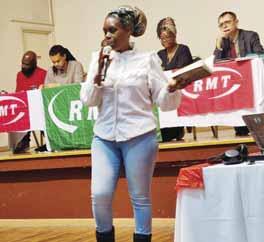
but also inspire future generations.
“Special thanks to BEMMAC vice chair Catia Mughusu-Eshimi, and BEMMAC Liaison committee members Beverleigh Thomas, Roy Osarogiabon, and Uche
Ngadi, our head office team whose efforts contributed to the event’s success,” she said. She said that if readers had any suggestions or ideas for next year's event, please feel free to reach out to bemmac@rmt.org.uk.


RMT national secretary
Darren Procter recently made a visit to members working on the Royal Research Ship (RRS) Sir David Attenborough, a research vessel owned by the Natural Environment Research Council and operated by the British Antarctic Survey for the purposes of both research and logistic support.
The RRS Sir David Attenborough is one of the most advanced polar research vessels in the world with a crew of 28 and up to 60 scientists.
The ship replaces a pair of existing vessels, RRS James
Clark Ross and RRS Ernest Shackleton. The latest vessel is named after broadcaster and naturalist Sir David Attenborough.
This multidisciplinary research platform is transforming how ship-borne science is conducted in the polar regions and provides scientists with state-of-the-art facilities to research the oceans, seafloor, ice and atmosphere.
The commissioning of the RRS Sir David Attenborough was part of a major government investment in polar infrastructure which will keep Britain at the forefront
RMT national secretary
Darren Procter, regional organiser Kathy Mazur and Harwich International Port union representatives Robin Wallace, Dean Galloway and Chris Wilcocks met with company representatives in the port recently to discuss terms and conditions and
other issues concerning the membership at the port.
Kathy operated as lead officer for the port, but the responsibility has been handed to Darren Procter. She thanked the Harwich reps for the great work they put in with her over the past three years.
of world-leading research in Antarctica and the Arctic. This £200 million commitment represents the UK governments’ largest investment in polar science since the 1980s.
Darren’s visit was designed to update all members employed onboard, provide information and create discussion amongst those working onboard about terms and conditions any other issues including the role members can play within the union.
“I am calling upon every member to make their workplace an organised
workplace that gives them and every member a voice and an ability to shape the progression of your terms and condition of employment.
“RMT has been in negotiations with the employer, who has identified honestly about the difficulties in attracting seafarers to work onboard the vessel.
“We remain in dialogue with the employer to get an offer that is acceptable to members and will provide updates as we seek progress on rates of pay and any concerns that have been raised,” he said.


In a resounding testament to organisation and solidarity, RMT’s London Underground Fleet branch is celebrating a significant milestone of passing the 2000-member mark by unveiling its new banner.
Behind this remarkable achievement lies the dedication and commitment of reps and activists working tirelessly to recruit, organise and engage with members across LU Fleet to ensure voices are heard, workers’ rights are protected and conditions improved in the workplace.
In the early 1990’s, London Underground went through a major company restructure in what was infamously known as the ‘Company Plan’: a
complete re-shape of the company that haemorrhaged staff with voluntary redundancies. RMT too had to re-build in this area, which resulted in the merger of two long standing branches.
‘LU Fleet branch’ was formed with the merging of two previous branches:
‘London Number 7’ (founded in 1921) which was made up of Carriage Examiners, Cleaners, Pump Engineers, Lifts & Escalators, & Conciliation staff and ‘West Ealing No 2’, which covered the Railway Engineering Workshops.
This newly merged branch consisted of just under 1,000 RMT members across all London Underground Fleet Maintenance Grades, Engineering Workshops,
cleaners and security.
LU Fleet was formed by a handful of RMT reps across the two branches, with special mentions to those who laid the foundations for what the branch is today: Jim Dickinson, Martin Eady, Harry Clements, Martin White, Dick Godfrey, Jack Evans, Joe Curren, Ted Cogger and Mickey Holt to name but a few.
As the new millennium dawned, Bill Teale followed Jim Dickinson as branch secretary carrying out the role for well over a decade, before handing over the reins to Neil Atkinson.
After a long tenure, Neil stood down in 2022 before ultimately retiring a year later, when long standing previous chair Tony Carter-Leay moved
into the branch secretary role, conducting meetings with chair Kyle Dempsey.
Tony said that to be the branch secretary at such a time was a very proud moment.
“I’ve been involved with the branch for over 20 years and over that time I’ve seen us slowly grow, challenging other unions as well as taking on the bosses and in some cases winning agreements that have protected the roles of LU Fleet members, such as the Core Work Agreement.
“At the same time, we have been at the heart of the fight to get cleaning grades back in-house since outsourcing in 1991 and are closer to being so with the recent victory of lower paid sub-contracted staff
issued free travel on TfL Services.
“But the fight never stops and so we will carry on defending, organising and hopefully growing so it’s very timely that we can finally unfurl the inaugural LU Fleet banner,” he said.
Branch chair Kyle Dempsey also said that it was a fantastic milestone to reach and a historic moment that couldn’t have been done without officers, reps and activists past and present.
“We have a huge appreciation for the hard work, activists and reps who came before and carved a path for us and I have no doubt that our branch will continue to grow.
“We share experience and encourage the younger generations by arming them with the mindset to protect what has already been won and strive for continuous improvement, with an understanding that everything we do and all that we achieve is way bigger than just individuals,” he said.
LU Fleet branch has been through many defining events in its 30 plus year history with the ‘Company Plan’, LU
LONDON Underground Fleet branch gives out the Jack Evans and Harry Clements award when a branch member has gone beyond the call of duty for members.
This year, for the first time, two branch members Rhys Harmer and Chris Carrett have been awarded the prestigious accolade for outstanding work representing members and building the branch.
privatisation and private infrastructure companies before coming back into public ownership after their collapse.
The current ongoing dispute of ‘Pensions, Jobs & Agreements’, is now the longest running dispute in the region’s history with seven successive and successful ballots, formed across all LU branches.
Despite these challenging issues or the Covid-19 pandemic, LU Fleet branch has gone from strength to strength. To date, the branch has just shy of 2,100 members after 34 years of hard work it has managed to more than double the membership.
Recent big victories for contracted cleaning staff have helped spur membership in outsourced areas, with official RMT recognition now at ABM.
LU Fleet remains steadfast in their ongoing campaigns to bring ABM, Alstrom (Northern Line maintenance) and Mitie Security back in-house. It is committed in its mission to ‘organise the future’ with a steadily growing membership base and an unwavering collective commitment.





In 1799 and 1800 two Combinations Acts were passed into law which were designed to ‘prevent Unlawful Combinations of Workmen’ and prohibited the existence of trade unions and any form of collective bargaining by workers.
Under these laws any ‘combination’ of two or more ‘masters’, or two or more ‘workmen’, to lower or raise wages, or to increase or diminish the number of hours of work, or quantity of work to be done, was punishable under common law.
The laws were presented as preventing any syndicate or cartel but, of course, no employer was ever prosecuted.
In his seminal book The Making of the English Working Class, historian EP Thompson points out that “in the years between 1780 and 1832 most
English working people came to feel an identity of interests as between themselves, and as against other men whose interests are different from (and usually opposed to) theirs”.
This sharpening of class interests did not go unnoticed by emerging capitalist elites.
The government of William Pitt the Younger believed that workers would take strike action during any political conflict to force the government to accede to their demands.
It was clear that the influence of the French revolution of 1789 and the rise of militant Jacobin republican activity had struck fear into the hearts of the British establishment particularly after the success of the American revolution and the Declaration of Independence on July 4, 1776.
These events led to an upsurge in radical political thought exemplified by the rather eccentric MP John Wilkes who championed political liberty, Thomas Paine who published The Rights of Man, Mary Wollstonecraft who wrote A Vindication of the Rights of Woman and radical poets such as the visionary William Blake, William Wordsworth and Robert Burns.
As a result of these growing political and social tensions, the Combination Acts were designed to reign in workingclass power and had the effect of simply driving trade union activity underground.
Predictably, the Acts did nothing to prevent the rising tide of anger of working people against low pay, poor working conditions and the high price of food. This crisis deepened after the end of the Napoleonic Wars in 1815
which witnessed a severe economic slump, chronic unemployment and harvest failure all worsened by the Corn Laws, which kept the price of bread high.
Radical and working-class movements at the time identified parliamentary reform as the solution as only around 11 per cent of adult males had the vote and very few of them in the industrial north.
A mass campaign to petition parliament for male suffrage gained three-quarters of a million signatures in 1817 but was flatly rejected by the House of Commons.
When a second slump occurred in early 1819, huge crowds were mobilised to force the government to back down. The movement was particularly strong in the north-west, where the Manchester Patriotic Union
organised a mass rally in August 1819 which would become known as the Peterloo Massacre.
On Monday August 16,1819 eighteen people died and over 700 were injured when the local cavalry, with swords flying, was ordered to charge a crowd of around 60,000 people.
The poet Percy Bysshe Shelley, unknown in his lifetime, responded to this judicial mass murder by writing The Mask of Anarchy that year. His call for freedom and resistance has echoed down the centuries and inspired generations:
“Rise, like lions after slumber In unvanquishable number! Shake your chains to earth like dew Which in sleep had fallen on you: Ye are many—they are few!”
Growing sympathy for the plight of the working poor forced the repeal of the 1799 and 1800 Combination Acts in 1824 following a campaign led by the radical London tailor Francis Place and Joseph Hume MP.
Organised workers used this new-found freedom to campaign for better wages and conditions, heralding a wave of strike action. In response, land and factory owners immediately fought back and connived with politicians to introduce the Combinations of Workmen Act 1825 which reimposed severe criminal sanctions for picketing and other trade union activity.
This once again put working people at a disadvantage over the capitalist class with predictable results as workers found other ways to assert their interests.
This included the infamous Swing Riots, a widespread uprising in 1830 by agricultural workers in across England
against poverty, harsh working conditions and agricultural mechanisation. Workers would meet at night, swear allegiance to each other and send anonymous letters to farmers and landowners to demand that they pay the rate for the work or face having their farm burnt down. The letters were signed Captain Swing.
The riots began with the destruction of threshing machines in East Kent in the summer of 1830 and by December it had spread throughout southern England to become the largest movement of social unrest in 19th-century England.
In 1834 six agricultural labourers from the village of Tolpuddle in Dorset were arrested and tried for swearing a secret oath of allegiance to each other, they became known as the Tolpuddle Martyrs.
Led by George Loveless, the group had formed the
Friendly Society of Agricultural Labourers during a dispute over wage cuts that reduced their income to near-starvation levels.
Such unions were technically legal under the 1825 Act, but the British establishment invoked another obscure 1797 law against ‘unlawful oaths’ to convict the men and sentence them to penal transportation in Australia.
The Tolpuddle Martyrs became a popular cause and galvanised the early trade union movement. Following mass protests, the martyrs were pardoned and returned to England between 1837 and 1839. Throughout this period of harsh state oppression, trade unionists were learning important lessons about how to confront the employers and the ruling class and to slowly advance their cause of democracy and workers’ rights.

An RMT member who suffered a broken ligament to the middle finger on her right hand while tackling a fare evader has received compensation following her ordeal. The injury occurred when a passenger forced open the ticket barrier the member was staffing, overstretching the middle finger, causing significant damage.
The RMT member instructed workplace injury experts at Thompsons
Solicitors to bring a claim for compensation and it was possible to negotiate a satisfactory settlement without court proceedings. The insurers accepted responsibility for the incident, and our member received an out-of-court settlement of £10,924.75, reflecting the severity of her injury and its impact on her personal and professional life.
The successful recovery of damages in this case underscores the importance of

the union’s legal services. This outcome will also assist health and safety reps in the workplace and help prevent similar accidents in the future.
An RMT member who suffered a noise-related injury at work has received a financial settlement in relation to the incident. The incident occurred when the member, operating a 1972 Tube Stock train, was unable to switch off the hightone whistle in the cab.
The member sounded the high-tone whistle as a warning to staff on the tracks. However, the toggle that activated the whistle became stuck, and the whistle continued to sound. Unable to silence the whistle, the member radioed control. To explain the situation and receive instructions, the member had to remove his hearing protection, exposing him to harmful levels of noise. This excessive noise led to stress, constant earache, headache, and bilateral
If you are experiencing difficulties in the workplace and need advice regarding a potential employment tribunal claim contact the union.
In the first instance, ensure that you contact your local RMT Representatives or Regional Organiser. Then complete an L2 – Request for Legal Assistance (available on-line) and send it to your Regional Office with all supporting documentation.
RMT’s legal department deals with virtually all cases from assessment to the case’s conclusion at a tribunal for members across England and Wales. The legal department has also submitted claims to Employment Appeal Tribunals. The in-house legal department is now firmly established and employs four solicitors and continues to advise and support
members in their work-related criminal cases in the Magistrates Court.
This often involves defending members against false allegations made by the public of assault, false allegations of theft and alleged driving offences. Furthermore, it continues to offer tailored advice and support for bus and taxi drivers, in respect of their licensing issues, licensing appeals before the Magistrates Court, driving offences, and in respect of appearances before Traffic Commissioners.
The In-house legal department continues to strive to deliver a first-class service to all of members. They are committed to provide a strong service to assist the union through the ever-changing legal landscape and their successes have grown yearly.
intrusive tinnitus.
Following his ordeal, the member instructed workplace injury experts at Thompsons Solicitors to bring a claim for compensation. Despite the defendant's denial of liability, expert evidence was obtained from an engineer specialising in occupational noise exposure and a medical expert in the field of hearing damage.
The defendant’s insurers initially refused to negotiate a settlement, necessitating the commencement of court proceedings but a settlement
was reached without the need for a trial.
An RMT member who suffered injuries while employed as a signaller has received compensation from his employer, Transport for Wales. The member was walking towards the signal box in an area that was dark due to lights being in disrepair—a hazard that had previously been reported.
He lost his footing and fell, landing on his left arm, which
First and foremost, I want to extend my heartfelt thanks to all the members who participated in the recent election. Your involvement is the driving force behind our union, and I am deeply honoured to have been elected as your president.
I would also like to express my commiserations to my opponent, Fraser Scott. Fraser ran a passionate campaign, and I know he shares the same commitment to improving the lives of those we represent. We are all on the same side, united in our goal of achieving a fairer, stronger future for workers.
Throughout my campaign, I had the privilege of meeting incredible members and activists. These conversations reinforced the dedication, passion, and tireless effort that keep RMT strong and united. The strength of our union has always come from its members. Our union is—and always will be—led by its members.
At the heart of this strength are the unsung heroes: the
pulled on an anti-slip on the stairs, resulting in injury. An adequate risk assessment and timely repairs to the lighting could have prevented the incident and injuries.
Following the incident, the lights were repaired. The member instructed workplace injury experts at Thompsons Solicitors to bring a claim for compensation. The defendant admitted liability and a medical expert determined that the member sustained grazing to both forearms and elbows. The injuries took about four weeks
to heal, leaving scarring. The accident also accelerated preexisting arthritis in the left elbow by up to one year.
Settlement negotiations resulted in the member receiving a settlement award of £7,000, reflecting the severity of the injuries.
All these cases demonstrates that the union is committed to taking on cases that claim companies and no win/no fee solicitors might not, ensuring members receive the support and justice they deserve.
representatives who work tirelessly at the branch level to resolve problems, ensure voices are heard, and protect workers’ rights. Branch meetings are not just spaces to learn what is happening—they are places where decisions are made, and actions are set in motion. These meetings are essential forums where members can shape the direction of the union and ensure we continue to represent everyone effectively.
While RMT is a strong and respected union, there is always more we can achieve. For this, we need more members to actively engage. It’s vital that more of us recognise the importance of participating in the democratic processes of our union. Every voice matters and the more of us who contribute, the stronger we become.
Now, more than ever, trade unions play a critical role in the modern workplace. While some employment practices have improved, this is no time to become complacent. We must continue to fight until every

worker enjoys fair wages, secure jobs, and respect in the workplace. This is not a moment to ease up—it is a call to press forward with renewed energy and purpose.
The reality is this: despite the glossy corporate slogans and ‘values’ displayed in mess rooms the primary goal of most companies in our industry remains profit. That pursuit often leaves workers behind. It is up to us, as a union, to ensure workers are treated fairly and their rights are protected.
Your involvement is critical to this effort. Local branches are the lifeblood of the union —the spaces where your voice truly matters. It is at branch meetings where real issues are raised, collective solutions are crafted, and the moral compass of our industry is reclaimed.
I urge every member to take the step of getting involved. Attend your local branch meetings and make your voice
heard. Whether it’s sharing your experiences, supporting a colleague, or organising for change, your actions make a difference. Together, we can ensure that the union remains a powerful force, advocating for workers and fighting for what is right.
Let’s also work to make our branches welcoming places for new voices and ideas. A union is strongest when it reflects the diversity of its members and we must ensure that everyone feels encouraged to participate. By keeping the door open to fresh perspectives, we not only strengthen our union today but also secure its future.
Finally, I want to pay tribute to my predecessor, Alex Gordon, who has stewarded the business of our union over the past three years with precision and competence. Alex’s leadership has left the union in a strong position and I hope to build on his efforts as we move forward together.
George Welch
RMT Cardiff Rail branch held a special event for Kelvin Lewis who has reached 60 years in membership.
RMT assistant general secretary John Leach presented a special award and certificate with great pleasure.
“Members like Kelvin are the bedrock of this union and feel honoured to be asked to
RMT Crewe No.1 branch celebrated a year of growing activity and recruitment with outgoing RMT president Alex Gordon at a Long Service Awards evening for two valued RMT members.
Sally Vickers, a Guard with Transport for Wales, received her 10-year badge. RMT President, Alex Gordon presented Robert Brown, a Network Rail Signaller with a 40-year badge and medal as a mark of respect and gratitude for his loyalty to the union.
present such an award,” he said.
Kelvin started as an oiler in Tondu, straight from school all the way back in 1964! He went on to work as a guard on both freight and passenger and a station supervisor and most recently as a replacement bus coordinator. The group photo is all the other members of the

branch who received 25-year badges including John Whitehead and Andrew Piper and10 year badges to Leighton Bryan, Mike Davies,
Robert recalled that he had started work with British Rail in 1984 as ‘Messenger Boy’ and worked his way up.
Alex congratulated Crewe No.1 branch secretary Rebecca Stokes on rebuilding a thriving all-grades RMT branch and bringing together rail workers including outsourced cleaning staff, Unipart Rail members fighting derecognition and RMT Reps from West Midlands Trains, Transport for Wales, Avanti West Coast and Network Rail.

Dave Barber and Juan Rodriguez also featured is Cardiff Rail branch chair Sean McCarthy.


RMT North Wales Coast branch chair Paul Wild presented signaller Stuart Cawthray with his 40-year membership badge at his Llandudno Junction signal box recently.
RMT branch chair Steve Loeber presents Tony Byrne, a member of Network
Paul said that one of the first questions Stuart asks any new starter or anyone new to our area is ''are you in RMT'' such is his dedication and support to our union.
“During his forty years
Rail Ops based at Liverpool Street, with his badge for forty years of loyal membership.
Stuart has worked in most of the signal boxes along the North Wales Coast.
“Thank you, Stuart, for your support to the union and good luck for the rest of your career,” he said.


Merseyside rail members were saddened to hear of the recent passing of a railway legend and Union stalwart Vinnie Gumbs.
He had a varied railway career starting off on the Pway and graduating to the footplate as a second man. With the demise of that role, Vinny redeployed to the welding department at Liverpool Edge Hill.
It was in this role in early 1980 that I first met Vinny, when he attended a mysterious points run through at my signal box. The Trinidadian giant arrived with a gas bottle on his shoulder and the calming words “don’t worry lad we’ll sort this, no one will know” those were the days!
Vinny became a regular
attender at the then Liverpool No4 branch, now Central & North Mersey, where we became good friends and comrades. He had now moved again to the Ultrasonic dept, firstly at Edge Hill then in later years at Chester.
It was the inception of the Black and Ethnic members advisory committee that brought Vinny Gumbs to the attention of the wider national union membership. He was a very unwilling participant at first and used to wag his finger at me with that infectious laugh, and say I pushed him into it, which was true.
However, Vinny went on to become the national chair of the BEMAC. It was while he was in that role that a certain manager took a dislike to Vinny’s union activities. Whilst
on a training course the manager posted a picture of a monkey on the notice board with words written on it linking it to Vinny and his union activity.
Members outraged at this unbelievable act of vile racism, especially against someone who was so widely respected and loved amongst his fellow rail workers. The union’s legal team sprang into action and all measures were taken to deal with this outrageous racist attack.
I was Vinny’s branch secretary at the time, and there were joyous celebrations at the legal victory that ensued. It was such a highprofile case that the regional TV news covered it on their main news, with live footage from a well-known Edge Hill

establishment with Vinny downing a celebratory pint of his favourite “Golden” surrounded by cheering workmates.
Vinny was a gentle giant of man with an infectious smile and a beautifully kind nature. He has a very large family, with many of his sons, daughters and grandchildren following him into a railway career, ensuring that the legendary Gumbs family name remains enshrined in the Merseyside railway DNA.
Falconer Dan Smith uses a Harris Hawk as pest control at Essex stations
When falconer Dan Smith joins the train at Benfleet on the c2c line in Essex with his 23year-old Harris Hawk named Elsa he causes quite a stir.
Elsa is a rescue animal which Dan nursed back to health himself and today this beautiful bird is very much at ease with an inevitably inquisitive public.
Dan works for GB Hawking which is contracted to clear railway stations including those from Barking to Shoeburyness.
“Harris Hawks are very
popular for use in falconry because they are relatively easy to control and, unusually, they work together with other hawks when hunting.
“We use these birds of prey to deter pigeon populations from growing in public areas.
“This is a real health and safety issue as droppings mix with feathers and when they dry out it represents a very real airborne health hazard for passengers,” he said.
Cleaners on the rail network everywhere can testify to what a problem pigeon droppings
represent to workers and members of the public alike.
So, what does the public think of this arresting site on the morning train?
“I get all sorts of reactions but generally people appreciate the beauty of a hawk.
“Pigeons soon get to know when one is around and it deters flocks of them settling around the buildings we work around,” says Dan, a man with clearly a deep knowledge and affection for these magnificent animals.

The London Widows and Orphan Funds was formed in the mid 1960’s by several branches and former regional organiser Jim Stevenson who organised outings to the seaside and presents at Christmas plus any financial support if needed.
At the start Warren (Wally) Levy was chairman and Jim Stevenson was secretary. Jim was very passionate about the fund as he had been an orphan himself and worked tirelessly to better the lives of members’ widows and orphans.
Sadly in 2019 Jim passed away and the fund was in danger of closing but was saved by a new committee formed by chair Tony Bidwell, Allan Jeyes secretary and Wally Levy as treasurer. But the committee was finding it hard to continue so last year new volunteers to continue the great work Jim had started.
A new committee was formed with Allan Jeyes as chair, secretary Paul Cox, treasurer Stewart Cameron and assistant secretary Stephen Loeber with old and
new members including RMT regional organiser Kathy Mazur.
Today the work of the committee has extended from the current London area to national coverage retaining the name London Widows & Orphan Fund in respect of its founder Jim Stevenson but assisting bereaved widows and orphans of nationally, through branches and regional councils including Northern Island, Belfast Shipping branch, and Republic of Island, Eire Shipping branch.

If you want any further or donating to support the LWOF please use our new email address that is rmtwof@rmt.org.uk and get in contact.





















